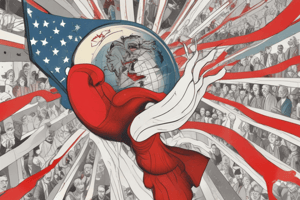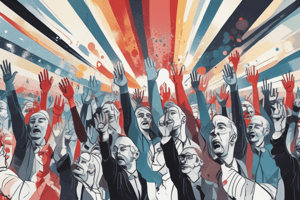Podcast
Questions and Answers
Define politics as power.
Define politics as power.
The exercise of power to influence the actions of others, shape political agendas and preferences, and decide how resources are distributed.
What are ideas in the context of politics?
What are ideas in the context of politics?
The foundational units of politics, the things individuals believe about themselves, society-at-large, the nation, the world, and various political phenomena.
What are interests in the context of politics?
What are interests in the context of politics?
The articulation of political ideas as individual or collective political demand and desires.
What are institutions in the context of politics?
What are institutions in the context of politics?
Define government.
Define government.
What is a republic?
What is a republic?
What is a democracy?
What is a democracy?
What is a democratic republic?
What is a democratic republic?
Name the seven important ideas that influence American politics.
Name the seven important ideas that influence American politics.
What is liberty?
What is liberty?
What is meant by negative liberty?
What is meant by negative liberty?
What is positive liberty?
What is positive liberty?
Define self-rule.
Define self-rule.
What is direct or pure democracy?
What is direct or pure democracy?
What is representative democracy or a republic?
What is representative democracy or a republic?
What is a mixed-system democracy?
What is a mixed-system democracy?
What does limited government imply?
What does limited government imply?
Define individualism.
Define individualism.
What is the American Dream?
What is the American Dream?
What is equality?
What is equality?
Define social equality.
Define social equality.
What is political equality?
What is political equality?
Define economic equality.
Define economic equality.
What is equal opportunity?
What is equal opportunity?
What is equal outcome?
What is equal outcome?
Describe religion's presence within American society.
Describe religion's presence within American society.
What is American exceptionalism?
What is American exceptionalism?
What is rational choice theory?
What is rational choice theory?
Flashcards
Politics
Politics
The exercise of power to influence actions, agendas, and resource distribution.
Ideas (in Politics)
Ideas (in Politics)
Fundamental beliefs about individuals, society, and political phenomena.
Interests (in Politics)
Interests (in Politics)
Political ideas expressed as individual or collective demands.
Institutions (in Politics)
Institutions (in Politics)
Signup and view all the flashcards
Government
Government
Signup and view all the flashcards
Republic
Republic
Signup and view all the flashcards
Democracy
Democracy
Signup and view all the flashcards
Democratic-Republic
Democratic-Republic
Signup and view all the flashcards
7 Influential American Ideas
7 Influential American Ideas
Signup and view all the flashcards
Liberty
Liberty
Signup and view all the flashcards
Negative Liberty
Negative Liberty
Signup and view all the flashcards
Positive Liberty
Positive Liberty
Signup and view all the flashcards
Self-Rule
Self-Rule
Signup and view all the flashcards
Direct (Pure) Democracy
Direct (Pure) Democracy
Signup and view all the flashcards
Representative Democracy (Republic)
Representative Democracy (Republic)
Signup and view all the flashcards
Mixed-System Democracy
Mixed-System Democracy
Signup and view all the flashcards
Limited Government
Limited Government
Signup and view all the flashcards
Individualism
Individualism
Signup and view all the flashcards
Social Democracy
Social Democracy
Signup and view all the flashcards
The American Dream
The American Dream
Signup and view all the flashcards
Equality
Equality
Signup and view all the flashcards
Social Equality
Social Equality
Signup and view all the flashcards
Political Equality
Political Equality
Signup and view all the flashcards
Economic Equality
Economic Equality
Signup and view all the flashcards
Equal Opportunity
Equal Opportunity
Signup and view all the flashcards
Equal Outcome
Equal Outcome
Signup and view all the flashcards
Religion (in America)
Religion (in America)
Signup and view all the flashcards
American Exceptionalism
American Exceptionalism
Signup and view all the flashcards
Rational Choice Theory
Rational Choice Theory
Signup and view all the flashcards
Study Notes
- Politics involves the exercise of power to influence actions, shape agendas, and allocate resources.
- Ideas are foundational to politics, reflecting beliefs about individuals, society, the nation, the world, and political events.
- Interests represent the articulation of political ideas into individual or collective demands.
- Institutions are the organizations, norms, and rules structuring government and public action.
- Government is a system wielding authority over a specific area, enforcing laws, and generally holding a monopoly on legitimate violence.
- A republic is a government where citizens rule indirectly through elected representatives.
- A democracy is a government where citizens rule directly and make decisions themselves.
- A democratic republic is a system where elected leaders represent the people, making and enforcing laws.
- Seven key ideas influence American politics: liberty, self-rule, limited government, individualism, the American Dream, equality, and religion.
Liberty
- Liberty is the ability to pursue one's desires without interference.
- Negative liberty is freedom from constraints or interference.
- Positive liberty is the freedom and ability to pursue goals.
Self-Rule
- Self-rule is the concept that legitimate government comes from the people.
- Direct or pure democracy involves citizens making decisions without elected officials.
- Representative democracy or a republic utilizes elected representatives for decision-making.
- Mixed-system democracy combines elected representatives with direct citizen involvement through mechanisms like referendums and initiatives, as seen in the US.
Limited Government
- Limited government reflects a distrust of centralized leadership and seeks to restrict governmental power.
- Many Americans desire increased government intervention, despite the concept of limited government.
- Limits power by distributing it to the people.
Individualism
- Individualism emphasizes individual responsibility for well-being, rather than societal responsibility.
- Policy outcomes can include weaker social safety nets and reduced public investments.
- Individualism-based democracies stand in contrast to social democracies.
Social Democracy
- Social democracy involves citizens being responsible for each other's well-being, utilizing government policy to ensure care for all.
The American Dream
- The American Dream posits that any American can achieve success through talent and hard work.
- It is tied to the concept of economic mobility.
- Considered a myth
Equality
- Equality means all citizens have the same privileges, status, and rights under the law.
- Social equality implies all individuals have the same status in society, largely applicable in the US.
- Political equality means all citizens have the same political rights and opportunities, mostly applicable in the US.
- Economic equality refers to minimal wealth disparities among citizens.
- Equal opportunity suggests every American has an equal chance for economic success; applicable in the US.
- Equal outcome suggests citizens should have roughly equal economic circumstances, which is not applicable in the US.
Religion
-
Religion is uniquely prevalent in American society.
- 87% of Americans believe in a deity.
- 54% belong to a religious institution.
- 46% attend religious services at least monthly.
-
Religious rights are constitutionally protected.
-
American Exceptionalism is the belief that the US is unique due to its distinct ideas like equality, self-rule, and limited government.
-
Rational Choice Theory views individuals as rational actors who understand their political interests and act on them.
Studying That Suits You
Use AI to generate personalized quizzes and flashcards to suit your learning preferences.




